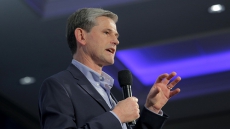OTTAWA - Leaders of Canada's three national Indigenous organizations will speak with Prime Minister Justin Trudeau by telephone Friday to discuss the impact of COVID-19 on Canada's Indigenous communities.
Assembly of First Nations Chief Perry Bellegarde, Inuit Tapiriit Kanatami president Natan Obed and Metis National Council vice-president David Chartrand were to meet with Trudeau and with Canada's premiers Thursday in Ottawa, but the meetings were cancelled after Trudeau placed himself in isolation due to COVID-19 concerns.
The three Indigenous leaders were told Thursday their in-person meeting with the prime minister would be postponed "indefinitely" but were told a call with all three and Trudeau would be organized for Friday.
The call will deal only with COVID-19.
A spokesperson for Bellegarde said the national chief is conscious of additional precautions being taken across Canada to prevent the spread of the virus, and that this has now become a primary focus for him leader of the AFN.
"(Bellegarde) will be reaching out to federal, provincial and territorial leaders and officials with the immediate and primary objective being to ensure all levels of government have prevention and response plans in place for the COVID-19 that address the unique situation of First Nations," said AFN spokesman Don Kelly.
The Indigenous leaders had planned to raise the unique needs of remote Indigenous communities when it comes to COVID-19 during their meetings with Trudeau and the premiers, noting that long-term boil water advisories and overcrowded housing places them at higher risk.
In an interview Wednesday, Bellegarde said he wants Ottawa and the provinces to ensure they have a "very specific prevention strategy" for First Nations communities to stop the spread of the virus, including additional people and money.
"It does require a different approach. A lot of (First Nations) are just fly-in communities and what happens if you have to evacuate the whole community?" he said.
"I think a greater focus (is needed) to realize there are 96 First Nations communities in Canada that are remote where they only have nursing stations in place, and that they require a very, focused, detailed approach to meet their needs if and when this COVID-19 hits them."
In Canada's 51 Inuit communities, known collectively as Inuit Nunangat, isolation would be a particular challenge given the high rates of overcrowded housing, Obed said.
"The concerns that we have is just the reality that we have 54 per cent overcrowding within our homeland and we have high rates of food insecurity and poverty, so we have challenges in relation to keeping people healthy," Obed said,
This is, in part, why the Inuit Tapiriit Kanatami is calling for Canada's Inuit to be considered a special, high-risk group in federal response planning.
Inuit are a high-risk group in general for respiratory infections, including tuberculosis. Long-standing social and economic inequities mean that Inuit communities could be disproportionately affected by COVID-19 and should be a priority for resources, the ITK said in a statement Thursday.
Being designated as a high-risk group would ensure the vulnerabilities of Inuit and potential severe negative outcomes from both illness and services disruption in Inuit communities are addressed, the statement said.
Obed did say Wednesday the federal government has said part of the $1 billion package announced that day for COVID-19 will be dedicated to an Inuit-specific response.
The Metis National Council issued a statement Thursday expressing concern that funds allocated to the First Nations and Inuit Health Branch as part of the federal government’s COVID-19 response will not be available to Metis Nation citizens.
A conference call was held among the MNC's board of governors to "discuss a strategy to protect Metis citizens, ensure they are not neglected by public-health authorities and communicate the needs of our communities to other jurisdictions and the public at large," the statement said.
NDP MPs Niki Ashton and Charlie Angus both raised alarm about whether the federal government's coronavirus response is properly taking into account the needs of Indigenous communities.
Ashton said First Nations in Northern Manitoba are "scared," especially those with no running water, overcrowded housing, no hospital and nowhere to self-isolate.
"The government needs to get real about what First Nations are facing on the ground. These communities need urgent infrastructure now and before the winter road season shuts down."
Indigenous Services Minister Marc Miller said the government is "exploring all options" to address these challenges including temporary isolation facilities and additional health staff for communities as needed.
"These supports for Indigenous communities are absolutely not limited by financial capacity. We continue to work closely with communities to co-ordinate resources."
